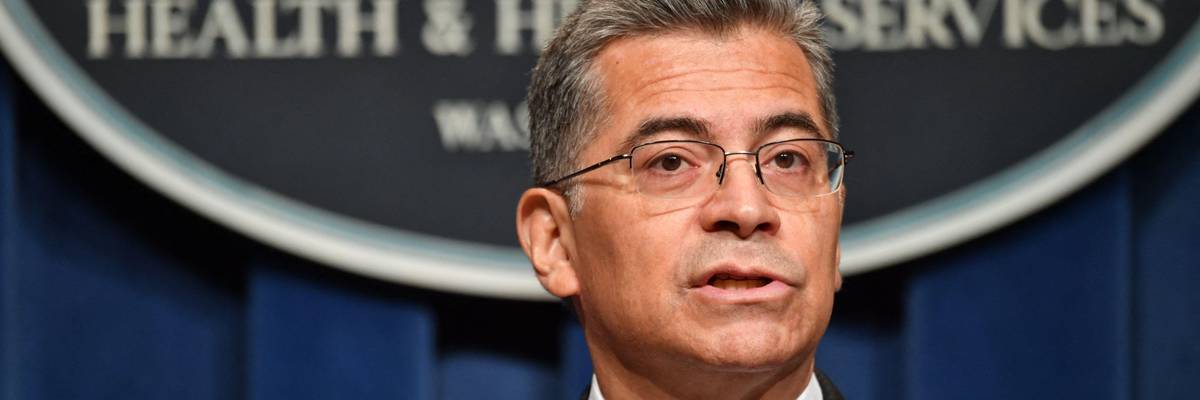

SUBSCRIBE TO OUR FREE NEWSLETTER
Daily news & progressive opinion—funded by the people, not the corporations—delivered straight to your inbox.
5
#000000
#FFFFFF
To donate by check, phone, or other method, see our More Ways to Give page.


Daily news & progressive opinion—funded by the people, not the corporations—delivered straight to your inbox.

U.S. Health and Human Services Secretary Xavier Becerra speaks during a press conference in Washington, D.C. on June 28, 2022. (Photo: Nicholas Kamm/AFP via Getty Images)
Following growing activist pressure and criticism, the Biden administration on Thursday declared monkeypox a national public health emergency, a move that empowers federal agencies to better direct resources toward combating an outbreak that's infected thousands of Americans.
"When you have an outbreak, the most important thing is you have to act fast, you have to mobilize."
Speaking to reporters at an afternoon press briefing, U.S. Health and Human Services Secretary Xavier Becerra said the administration is "prepared to take our response to the next level in addressing this virus, and we urge every American to take monkeypox seriously."
The administration's move follows a July 23 World Health Organization global health emergency declaration and similar designations by U.S. states, counties, and cities including California, Illinois, New York, New York City, Los Angeles, San Diego, and San Francisco.
Thanking the Biden administration "for taking this critical step to fight monkeypox," Democratic New York Gov. Kathy Hochul said that "this will allow us to respond even more aggressively by increasing our testing, treatment, and vaccination efforts."
Infectious disease experts and activists have criticized what they say is the federal government's lack of urgency in responding to monkeypox, which has infected more than 6,600 people in the United States as of Wednesday, according to the U.S. Centers for Disease Control and Prevention. The Biden administration has come under fire for waiting more than three weeks after the first confirmed U.S. monkeypox cases before moving to procure vaccine stocks.
The New York Times reported Wednesday:
The government is now distributing about 1.1 million doses, less than a third of the 3.5 million that health officials now estimate are needed to fight the outbreak. It does not expect the next delivery, of half a million doses, until October. Most of the other 5.5 million doses the United States has ordered are not scheduled to be delivered until next year.
"What I expected to see would have been a more vigorous kind of a response based on lessons that we've learned from... Covid-19, as well as lessons we've learned from the HIV response," Dr. Wafaa El-Sadr, founder and director of the International Center for AIDS Care and Treatment Program at Columbia University Mailman School of Public Health, told Voice of America.
"When you have an outbreak, the most important thing is you have to act fast, you have to mobilize," he added, "and you have to rally all your assets to work together really quickly to be able to do what's needed."
Related Content

Following the lead of public health advocates, U.S. Sen. Kirsten Gillibrand (D-N.Y.) on Wednesday urged the Biden administration to invoke the Defense Production Act to boost production and distribution of monkeypox vaccines.
"Right now there are enough vaccines in the United States to cover one-third of the community generally currently most at risk," she said.
Dear Common Dreams reader, The U.S. is on a fast track to authoritarianism like nothing I've ever seen. Meanwhile, corporate news outlets are utterly capitulating to Trump, twisting their coverage to avoid drawing his ire while lining up to stuff cash in his pockets. That's why I believe that Common Dreams is doing the best and most consequential reporting that we've ever done. Our small but mighty team is a progressive reporting powerhouse, covering the news every day that the corporate media never will. Our mission has always been simple: To inform. To inspire. And to ignite change for the common good. Now here's the key piece that I want all our readers to understand: None of this would be possible without your financial support. That's not just some fundraising cliche. It's the absolute and literal truth. We don't accept corporate advertising and never will. We don't have a paywall because we don't think people should be blocked from critical news based on their ability to pay. Everything we do is funded by the donations of readers like you. Will you donate now to help power the nonprofit, independent reporting of Common Dreams? Thank you for being a vital member of our community. Together, we can keep independent journalism alive when it’s needed most. - Craig Brown, Co-founder |
Following growing activist pressure and criticism, the Biden administration on Thursday declared monkeypox a national public health emergency, a move that empowers federal agencies to better direct resources toward combating an outbreak that's infected thousands of Americans.
"When you have an outbreak, the most important thing is you have to act fast, you have to mobilize."
Speaking to reporters at an afternoon press briefing, U.S. Health and Human Services Secretary Xavier Becerra said the administration is "prepared to take our response to the next level in addressing this virus, and we urge every American to take monkeypox seriously."
The administration's move follows a July 23 World Health Organization global health emergency declaration and similar designations by U.S. states, counties, and cities including California, Illinois, New York, New York City, Los Angeles, San Diego, and San Francisco.
Thanking the Biden administration "for taking this critical step to fight monkeypox," Democratic New York Gov. Kathy Hochul said that "this will allow us to respond even more aggressively by increasing our testing, treatment, and vaccination efforts."
Infectious disease experts and activists have criticized what they say is the federal government's lack of urgency in responding to monkeypox, which has infected more than 6,600 people in the United States as of Wednesday, according to the U.S. Centers for Disease Control and Prevention. The Biden administration has come under fire for waiting more than three weeks after the first confirmed U.S. monkeypox cases before moving to procure vaccine stocks.
The New York Times reported Wednesday:
The government is now distributing about 1.1 million doses, less than a third of the 3.5 million that health officials now estimate are needed to fight the outbreak. It does not expect the next delivery, of half a million doses, until October. Most of the other 5.5 million doses the United States has ordered are not scheduled to be delivered until next year.
"What I expected to see would have been a more vigorous kind of a response based on lessons that we've learned from... Covid-19, as well as lessons we've learned from the HIV response," Dr. Wafaa El-Sadr, founder and director of the International Center for AIDS Care and Treatment Program at Columbia University Mailman School of Public Health, told Voice of America.
"When you have an outbreak, the most important thing is you have to act fast, you have to mobilize," he added, "and you have to rally all your assets to work together really quickly to be able to do what's needed."
Related Content

Following the lead of public health advocates, U.S. Sen. Kirsten Gillibrand (D-N.Y.) on Wednesday urged the Biden administration to invoke the Defense Production Act to boost production and distribution of monkeypox vaccines.
"Right now there are enough vaccines in the United States to cover one-third of the community generally currently most at risk," she said.
Following growing activist pressure and criticism, the Biden administration on Thursday declared monkeypox a national public health emergency, a move that empowers federal agencies to better direct resources toward combating an outbreak that's infected thousands of Americans.
"When you have an outbreak, the most important thing is you have to act fast, you have to mobilize."
Speaking to reporters at an afternoon press briefing, U.S. Health and Human Services Secretary Xavier Becerra said the administration is "prepared to take our response to the next level in addressing this virus, and we urge every American to take monkeypox seriously."
The administration's move follows a July 23 World Health Organization global health emergency declaration and similar designations by U.S. states, counties, and cities including California, Illinois, New York, New York City, Los Angeles, San Diego, and San Francisco.
Thanking the Biden administration "for taking this critical step to fight monkeypox," Democratic New York Gov. Kathy Hochul said that "this will allow us to respond even more aggressively by increasing our testing, treatment, and vaccination efforts."
Infectious disease experts and activists have criticized what they say is the federal government's lack of urgency in responding to monkeypox, which has infected more than 6,600 people in the United States as of Wednesday, according to the U.S. Centers for Disease Control and Prevention. The Biden administration has come under fire for waiting more than three weeks after the first confirmed U.S. monkeypox cases before moving to procure vaccine stocks.
The New York Times reported Wednesday:
The government is now distributing about 1.1 million doses, less than a third of the 3.5 million that health officials now estimate are needed to fight the outbreak. It does not expect the next delivery, of half a million doses, until October. Most of the other 5.5 million doses the United States has ordered are not scheduled to be delivered until next year.
"What I expected to see would have been a more vigorous kind of a response based on lessons that we've learned from... Covid-19, as well as lessons we've learned from the HIV response," Dr. Wafaa El-Sadr, founder and director of the International Center for AIDS Care and Treatment Program at Columbia University Mailman School of Public Health, told Voice of America.
"When you have an outbreak, the most important thing is you have to act fast, you have to mobilize," he added, "and you have to rally all your assets to work together really quickly to be able to do what's needed."
Related Content

Following the lead of public health advocates, U.S. Sen. Kirsten Gillibrand (D-N.Y.) on Wednesday urged the Biden administration to invoke the Defense Production Act to boost production and distribution of monkeypox vaccines.
"Right now there are enough vaccines in the United States to cover one-third of the community generally currently most at risk," she said.